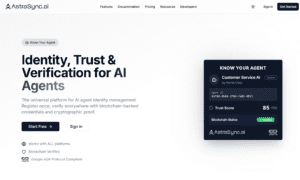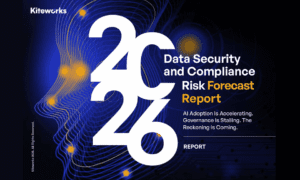As organizations master generative AI, a more sophisticated evolution is making waves in enterprise data management. Agentic AI – intelligent systems that can autonomously coordinate, reason, and execute complex data operations – promises to revolutionize how businesses handle their most challenging data problems.
Peggy Tsai, Chief Data Officer at BigID and newly appointed adjunct faculty for the AI Governance executive program, at the University of Denver, shares her insights on why this technology represents a critical turning point for enterprise data strategy.
Breaking Down Traditional Data Silos
“The challenge that people face isn’t just about having access to data,” explains Peggy, drawing on her two decades of experience in data management. “It’s about being able to leverage it, understand it, and integrate it into day-to-day operations. Agentic AI is a game-changer because it can dramatically increase the time to value for these data challenges.”
According to Gartner’s analysis, by 2028, 33% of enterprise software applications will utilize agentic AI, up from less than 1% in 2024. Traditional data management approaches have long struggled with the complexity of modern enterprise environments. Data often exists in isolated pockets, managed by separate teams with different priorities and skill sets. Agentic AI offers a solution by creating intelligent networks of specialized AI systems that can work together across these traditional boundaries.
A New Paradigm in Data Operations
What makes Agentic AI transformative is its ability to handle complex, interconnected data challenges that have traditionally required extensive human coordination. Imagine a data compliance scenario where multiple systems need to work in concert: one identifying sensitive data across various sources, another evaluating regulatory requirements, and a third implementing appropriate controls – all while adapting to changing regulations and business needs.
“Most people have only done data or privacy or security,” Peggy notes. “But the future lies in the intersection of these three domains. Agentic AI can help bridge these gaps by understanding the interconnections and managing them holistically.”
From Manual to Intelligent Automation
The impact of this technology extends far beyond simple automation. In Peggy’s experience, organizations often struggle with the sheer volume and complexity of their data management tasks. “Companies need a faster way of governing and managing data,” she emphasizes. “AI agents can take large sets of data and leverage data science algorithms to understand quality, calculate metrics, and identify where incomplete data exists – tasks that were previously done manually and often inconsistently.”
This shift from manual to intelligent automation represents a fundamental change in how organizations approach data management:
- Automated data quality assessment and enhancement
- Real-time compliance monitoring and adaptation
- Intelligent data classification and categorization
- Predictive data governance recommendations
- Dynamic policy enforcement and updating
Building for Success
However, implementing Agentic AI requires careful preparation. As Peggy points out, “It’s no longer a black-and-white role. There’s a lot of overlap between different domains, and organizations need to adapt their governance structures accordingly.”
Organizations need to focus on:
- Data Foundation
- Comprehensive data mapping and inventory
- Clear data quality standards and metrics
- Robust metadata management systems
- Governance Framework
- Updated policies for AI-driven decision making
- Clear lines of accountability and oversight
- Risk management protocols for automated systems
- Technical Infrastructure
- Scalable data processing capabilities
- Secure integration frameworks
- Monitoring and audit capabilities
According to Chetan Dube, founder and CEO of Quant, “Agentic AI may still be in its genesis, but its impact on the world will grow exponentially over the coming years. You must embrace its power, or go from a leader to an also-ran.”
The Path Forward
“AI is transforming how we interact with data,” Peggy observes. “With chatbot interfaces supported by AI, users can leverage natural language processing to get the information they need without having to know how to code or program. This democratization of data access is just the beginning.”
As organizations look to implement Agentic AI, Peggy recommends a phased approach:
- Start with clearly defined use cases that align with business objectives
- Build cross-functional teams that understand both data and domain requirements
- Implement robust monitoring and feedback mechanisms
- Continuously evaluate and adjust based on outcomes
Looking to the Future
The emergence of agentic AI marks a critical moment in enterprise data management. While still evolving, its potential to transform organizational data handling is clear. According to Silvio Savarese, Executive Vice President and Chief Scientist of Salesforce AI Research, we are witnessing “the third wave of AI evolution.”
He notes that “we are now moving into using genetic AI to automate entire tasks and perform actions on our behalf,” highlighting the shift from earlier predictive and generative AI models to today’s autonomous systems capable of executing complex tasks independently.
Organizations that begin preparing now will be better positioned to take advantage of these capabilities as they mature. Gartner forecasts that by 2025, 20% of digital storefront interactions will be conducted by AI agents, fundamentally reshaping customer engagement and data management practices. This transformation will drive the emergence of new roles, such as AI agent trainers and workflow orchestrators, as highlighted in recent industry analyses.
For enterprise data leaders, the imperative is clear: developing robust governance frameworks and technical infrastructure isn’t just about future-proofing – it’s about capturing competitive advantage in an increasingly AI-driven landscape. The future of enterprise data management is intelligent, coordinated, and automated – and it’s arriving faster than many realize.



































